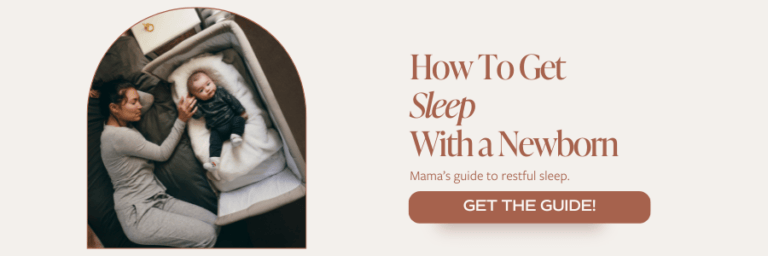
Postpartum Sleep Deprivation, Mama's Sleep Is Important Too
Sleep deprivation can significantly impact both your physical and emotional health. The often-repeated advice to “sleep when the baby sleeps” may seem like an unattainable irony, but incorporating small adjustments into your routine can help you find those crucial, uninterrupted hours of rest. Remember, it’s vital to communicate your need for sleep to your support system, reinforcing that a well-rested mama is important. The effects of sleep deprivation extend beyond being tired, and can even potentially be a contributing factor to the development of perinatal mood and anxiety disorders (PMADs), according to research. This lack of sleep not only wears on your patience and emotional resilience but can also diminish your ability to parent effectively, as fatigue makes it harder to meet both your needs and those of your baby.
Many new mamas report feelings of anxiety related to their baby’s sleeping patterns, leading many of us to hyper-fixate on sleep training or to experience feelings of anticipatory anxiety as the sun begins to set. This anxiety can further exacerbate sleep deprivation, creating a feedback loop that makes relaxation and sleep even more difficult to achieve. Concerns over whether you are meeting your baby’s needs or doubts about your parenting abilities often heighten at night when the world is quiet, adding to the stress and making it harder to fall asleep. Breaking this cycle is essential for both your well-being and your ability to provide attentive, loving care to your baby. By acknowledging these worries and addressing healthy sleep, you can take important steps towards improving your overall health and parenting experience.
Restful Sleep in the Postpartum Period is not only Possible but Crucial.

What is Postpartum Sleep Deprivation?
Sleep deprivation occurs when an individual gets less sleep than their body needs to feel awake and alert. You might be wondering, well how much sleep do you need? Although 7-8 hours is optimal, we know this is rarely feasible with a newborn. The goal is to protect 5 hours of uninterrupted sleep to protect against illness and to ward off any potential underlying depression and anxiety. Sleep deprivation is particularly prevalent among new moms, who often find themselves on a continuous cycle of feeding, changing, and caring for your new baby throughout the night. For a body that’s healing from childbirth, the effects of sleep deprivation can be especially daunting. Adequate rest is crucial for physical recovery postpartum, as it allows the body to repair tissues and regain strength. Additionally, for a new mom, navigating the challenges of motherhood without the full benefits of sleep can exacerbate feelings of exhaustion, affect emotional well-being, and hinder the ability to bond with your baby.
The lack of restful sleep not only slows down the physical recovery process but also amplifies the emotional rollercoaster associated with the postpartum period. It heightens feelings of anxiety and depression and can strain a mother’s capacity to connect with her infant. Recognizing the importance of sleep as part of the recovery and adjustment process is essential and we hope that this education can help mothers prioritize rest and get the night of sleep they need to protect physical and emotional healing after becoming a mother.
Can Sleep Deprivation Lead to Postpartum Depression?

Consequences of sleep deprivation include:
- Poor attention and decision making
- Poor performance on routine tasks
- Increased health concerns (diabetes, obesity)
- Emotional symptoms including: depression, anger, mood swings, frustration, anxiety, irritability, and poor coping skills
Postpartum women experiencing symptoms of depression often experience poor sleep quality, less total sleep time, longer sleep latency (how long it takes you to fall asleep), less time in REM sleep. In vulnerable populations, PMADs are twice as likely to occur!
While sleep deprivation is not the root cause of perinatal mood and anxiety disorders, it can intensify anxiety disorders such as OCD, PTSD, and panic attacks.
Wondering if your feelings of weepiness are considered ‘normal’ or may be signs of postpartum mood disorders? This free guide will help differentiate the baby blues from postpartum depression.
How to Get Better Sleep With a Newborn
Prioritize Yourself And Sleep Hygiene
New Parents Shouldn't Be Afraid to Ask For Help
You may be rolling your eyes at the thought of getting rest while tending to the round-the-clock demands of caring for a newborn; but we promise it can be done! Part of being a new mama is recognizing that you are in a season of receiving. It can be difficult for new parents to seek and accept help, but let this serve as your permission to do just that! Lean into your support system and allow yourself to take proper care of your mental and physical healing. Here are a few ways to accept help and protect some core hours of sleep: Delegate tasks at night. If bottle feeding, give the first feed duties to your partner. Creating a parent sleep schedule with a newborn allows both parents time to rest. Breastfeeding? Ask your partner to get the baby up, changed, and ready for the next feed. Sometimes taking that tiny task off your plate is more helpful than you think. Give yourself grace. This chapter is short but can seem never-ending. If you are experiencing sleep deprivation or symptoms of postpartum depression talk to your healthcare provider to discuss treatment options. Asking for help is a great sign of strength!
Don't Overthink Baby Sleep
New parents often worry about baby’s sleep patterns, but it’s important to step back and avoid overthinking it. Babies have different sleep cycles and needs that can vary widely, and what works for one may not work for another. Infant sleep is unpredictable and there is no handbook. Each baby is unique and a one-size-fits all sleep training plan doesn’t exist. Remember, occasional restlessness or sleep changes are normal as your baby grows and hits new developmental milestones. Focusing too much on achieving “perfect” sleep can add unnecessary stress for both you and your baby, potentially making sleep even more elusive. Being chronically sleep deprived in the postpartum period can be a risk factor for experiencing postpartum depression. Instead, aim for a relaxed approach, trusting in your baby’s natural rhythms and knowing that, in most cases, sleep patterns will stabilize with time. Providing a calm, soothing sleep environment and maintaining a flexible routine are key steps in supporting your baby’s sleep foundation without the anxiety of overthinking.

Tips to Help You Sleep Better
Lessen your expectations and set small, attainable goals in your day so that you can feel mastery even when it seems nothing is being accomplished. Practice good sleep hygiene. Come up with a bedtime routine that you look forward to and that is conducive to a restorative night. Three tips to improve your sleep:
- Establish a Relaxing Bedtime Routine: Consistency is key when it comes to sleep. Develop a bedtime routine that signals to your body it’s time to wind down. This could include activities like reading a book, taking a warm bath, or practicing relaxation exercises such as deep breathing or meditation. Avoid stimulating activities right before bed, such as watching TV or using other electronic devices, as the blue light can interfere with your ability to fall asleep. We love to make a warm mug of Needed Sleep + Relaxation Support. It’s like a hug in a mug and loaded with magnesium to promote relaxation. Use code THEMATRESCENCE for 20% off your purchase!
- Create a Comfortable Sleep Environment: Make your bedroom a sleep sanctuary. Ensure your mattress and pillows provide the support you need, and keep the room at a comfortable, cool temperature. Minimize noise and light exposure by using earplugs or white noise machines and blackout curtains or eye masks. A conducive environment plays a crucial role in enhancing the quality of your sleep.
- Mind Your Diet and Exercise: What you eat and how active you are during the day can affect sleep quality. Avoid large meals, caffeine, and alcohol close to bedtime as they can disrupt sleep patterns. Regular physical activity can help you fall asleep faster and enjoy deeper sleep, but try to finish exercising at least a few hours before going to bed to give your body time to unwind.
Make a Plan to Prevent A Lack of Sleep
To ensure you’re getting enough rest, creating a proactive sleep plan is essential. This should start with clear communication with your partner or support network regarding your sleep needs, emphasizing the importance of teamwork to relieve stress at bedtime. By dividing nighttime duties of caring for a new baby, each person can have a chance to experience deeper uninterrupted sleep. Alternating who tends to the baby during the night allows everyone designated periods of undisturbed rest. Establishing a regular sleep schedule that avoids fragmented sleep can significantly improve your overall sleep quality.
For a deeper understanding of how to enhance your sleep experience, explore our thorough guide to Restful Sleep. This resource is packed with tips to creating your unique sleep plan, setting up an ideal sleeping environment, and cultivating routines that foster optimal sleep health. With these strategies, you can lay the groundwork to get adequate sleep leaving you prepared to tackle the challenges and joys of the day ahead.
Lay a Sleep Foundation For The Whole Family
Related Posts

Lauren Hays, PMHNP
Lauren was a licensed and trained registered nurse in the NICU and has since made a career shift to focus on mental health. Lauren is now a board certified Psychiatric Mental Health Nurse Practitioner, focusing on women’s health and wellness. She is a mom of three precious little men who has turned her pain into passion.





